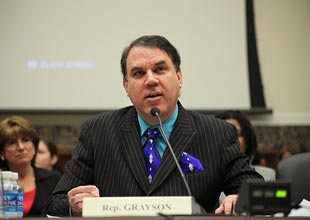
Flickr/<a href="http://www.flickr.com/photos/edlabordems/3616570651/">edlabordems</a> (<a href="http://www.creativecommons.org">Creative Commons</a>). Front page illustration: Joe Morse
Alan Grayson, the first-term Democratic congressman from central Florida, really didn’t like Thursday’s Supreme Court decision legalizing unlimited corporate spending in election campaigns. “It’s the worst Supreme Court decision since the Dred Scott case,” he told me last night. In Dred Scott, Grayson explained, the Supreme Court decided that neither slaves nor the children of slaves could ever be US citizens. In Citizens United v. FEC, decided Thursday, the Supreme Court ruled “that only huge corporations have any constitutional rights,” Grayson said. “They have the right to bribe, the right to buy elections, the right to reward their elected toadies, and the right to punish the elected representatives who take a stab at doing what’s right.”
I wrote a profile of Grayson for the most recent issue of Mother Jones. You can read the whole thing here.
Like independent campaign finance reform groups, Grayson saw this decision coming. Last week, he filed five bills that he hopes will help counteract the effects of the Court’s decision. On Wednesday night, he launched a website, savedemocracy.net, to rally support for these measures. On Thursday morning, he delivered over 10,000 signatures from a web-based petition to the Supreme Court. After the court issued its decision, he introduced a sixth campaign finance reform bill.
The Court’s decision creates serious problems for the Fair Elections Now Act (FENA), a bill that Grayson co-sponsored that would institute publicly financed elections. “The funding from FENA is a drop in the bucket compared to what the oil companies might spend to defeat representatives who don’t want to drill everywhere,” Grayson warned. “It’s a drop in the bucket compared to what Wall Street’s prepared to spend to reward those who vote for bailouts and punish those who won’t.” The Supreme Court has “created a whole new problem…. that really isn’t addressed by that bill,” Grayson said, while emphasizing that he still supported FENA because it is “a step in the right direction, but not sufficient.”
Via Grayson’s website, here are the six bills “and what they aim to accomplish,”:
- The Business Should Mind Its Own Business Act (H.R. 4431): Implements a 500% excise tax on corporate contributions to political committees, and on corporate expenditures on political advocacy campaigns.
- The Public Company Responsibility Act (H.R. 4435): Prevents companies making political contributions and expenditures from trading their stock on national exchanges.
- The End Political Kickbacks Act (H.R. 4434): Prevents for-profit corporations that receive money from the government from making political contributions, and limits the amount that employees of those companies can contribute.
- The Corporate Propaganda Sunshine Act (H.R. 4432): Requires publicly-traded companies to disclose in SEC filings money used for the purpose of influencing public opinion, rather than to promoting their products and services.
- The Ending Corporate Collusion Act (H.R. 4433): Applies antitrust law to industry PACs.
- The End the Hijacking of Shareholder Funds Act (H.R. 4487): This bill requires the approval of a majority of a public company’s shareholders for any expenditure by that company to influence public opinion on matters not related to the company’s products or services.
The fifth measure has already gained the support of Rep. John Conyers (D-Mich.), the chair of the House Judiciary committee, Grayson said. Grayson hopes the committee might hold a hearing on that bill sometime in the next 30 days. Grayson circulated his proposals among his colleagues on Thursday. He has a decent record with winning support for populist ideas— last year he signed up over 100 cosponsors for Texas Republican Ron Paul’s bill to audit the Federal Reserve.
Still, what Grayson could really use is the support of President Barack Obama, who has slammed the Supreme Court decision and promised a “forceful” legislative response. Grayson’s bills would certainly qualify. The Atlantic‘s Marc Ambinder has reported that the White House and other Hill Democrats are seriously considering three options for responding to the decision, including one that bears a resemblance to Grayson’s sixth bill—requiring shareholders to approve of independent political expenditures. When we spoke, Grayson also voiced support to another idea Ambinder says is under consideration—a “Stand by Your Ad” requirement. As Ambinder describes it, “The head of an insurance company would be forced to say, ‘I’m Honus Wagner, the CEO of Acme, and I stand by this ad.'” Grayson emphasized that such a move would be consistent with the Supreme Court’s decision today, which explicitly allowed Congress to pass tough disclosure requirements.














